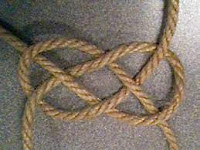The great craft decluttering process rolls on. I found a little box containing a number of tiny crosses- a wooden one from Jerusalem, a bullet case 'trench art' cross [my Grandad's from WW1] a tiny crochet cross, a Bahamian Sand Cross...I'm keeping them, And I found a postcard with a photo of a knot on it, and a prayer.
 I checked out the knot -it's a Carrick Bend [possibly named for carrack - large merchant ships operating C14-C17 round the English coast] But it has an older name ...
I checked out the knot -it's a Carrick Bend [possibly named for carrack - large merchant ships operating C14-C17 round the English coast] But it has an older name ...The Saxon or Wake Knot, was on the coat of arms of Hereward the Wake. [from Lincolnshire] For five years he headed up the resistance to William the conqueror and the Norman invasion. I suspect he gets forgotten in history lessons now - but from this contemporary description, he sounds like a good bloke
Comely in aspect, very beautiful from his yellow hair, and with large grey
eyes, the right eye slightly different in colour to the left. He was stern
of feature, with great sturdiness of his limbs, but
very active for his moderate stature, and in all his limbs was found a complete
vigour..and much grace and strength of body. From .. [his youth].. the character of his valour showed
him a perfect man, and he was excellently endowed in all things with the grace
of courage and valour of mind...
So that's Hereward the Wake [or Watchful] hero and knot-tyer.
What about the prayer? I thought it was a good thought to share with you on a Sunday
The KNOT Prayer
Dear God, Please untie the knots that are in my mind, my heart and my life.
Remove the have-nots, the can-nots and the do-nots
that I have in my mind.
Erase the will-nots, may-nots, and might-nots
that find a home in my heart
Release me from the could-nots, would-nots and should-nots
that obstruct my life
And most of all, dear God
I ask that you remove from my mind, my heart and my life
all of the am-nots
that I have allowed to hold me back,
especially the thought that I am not good enough.
AMEN



I've always connected that knot with the Carrick Roads; the waters around the town and port of Falmouth in Cornwall
ReplyDeleteSee Sue Jays very full comment below!
DeleteNice prayer; thank you for sharing.
ReplyDelete🙏
DeleteHereward the Wake was one of my childhood heroes having read lots of stories about him. My parents were local to the Newmarket area of Suffolk, not far from Ely which was Hereward’s campaign base so no doubt the stories were added to by the rest of the family. That said I have always associated the Carrick bend with Carrick Roads: the large, deep estuary area of the River Fal south of Falmouth. Carrick was the name of the district council centred on the Truro, Falmouth area before Cornwall became a unitary area in 2009. The Carrick bend was the district council’s logo. Incidentally Fal in Cornish means Prince, which brings us back to Hereward. A great post Ang which sent me down a “rabbit hole” this morning. I expect the prayer will resonate with a lot of readers too.
ReplyDeleteWe had a copy of Hereward The Wake by Charles Kingsley [author of the Water Babies] at home when I was growing up. I did read it back then, but have forgotten it [it was mostly novel, I understand, with just a few facts] Must try and find it again! I'm interested in the Carrick/Falmouth connection. Kirsten mentioned that too. Thanks foir a really useful comment!
DeleteBeautiful prayer!!
ReplyDelete🙏
DeleteA great prayer and very apt for me right now x
ReplyDeleteAlison in Wales xx
🙏
DeleteThat is interesting
ReplyDelete👍
DeleteHappy Sunday Angela. I just love The KNOT Prayer. Thank you for sharing it.
ReplyDelete🙏
DeleteThank you for giving us the lovely prayer. Catriona
ReplyDelete🙏
DeleteThank you for the prayer. For some reason it brought to mind a long forgotten prayer that I must have sung in my early years in the Church of England, although I'm sure it has been part of other denominations, too:
ReplyDelete"God be in my head, and in my understanding;
God be in my eyes, and in my looking;
God be in my mouth, and in my speaking;
God be in my heart, and in my thinking;
God be at my end, and at my departing."
That hymn is ancient, first published in the Sarum Primer in the 16th C. (Sarum is the old name for Salisbury in England, the monks compiled the hymn book)
Delete